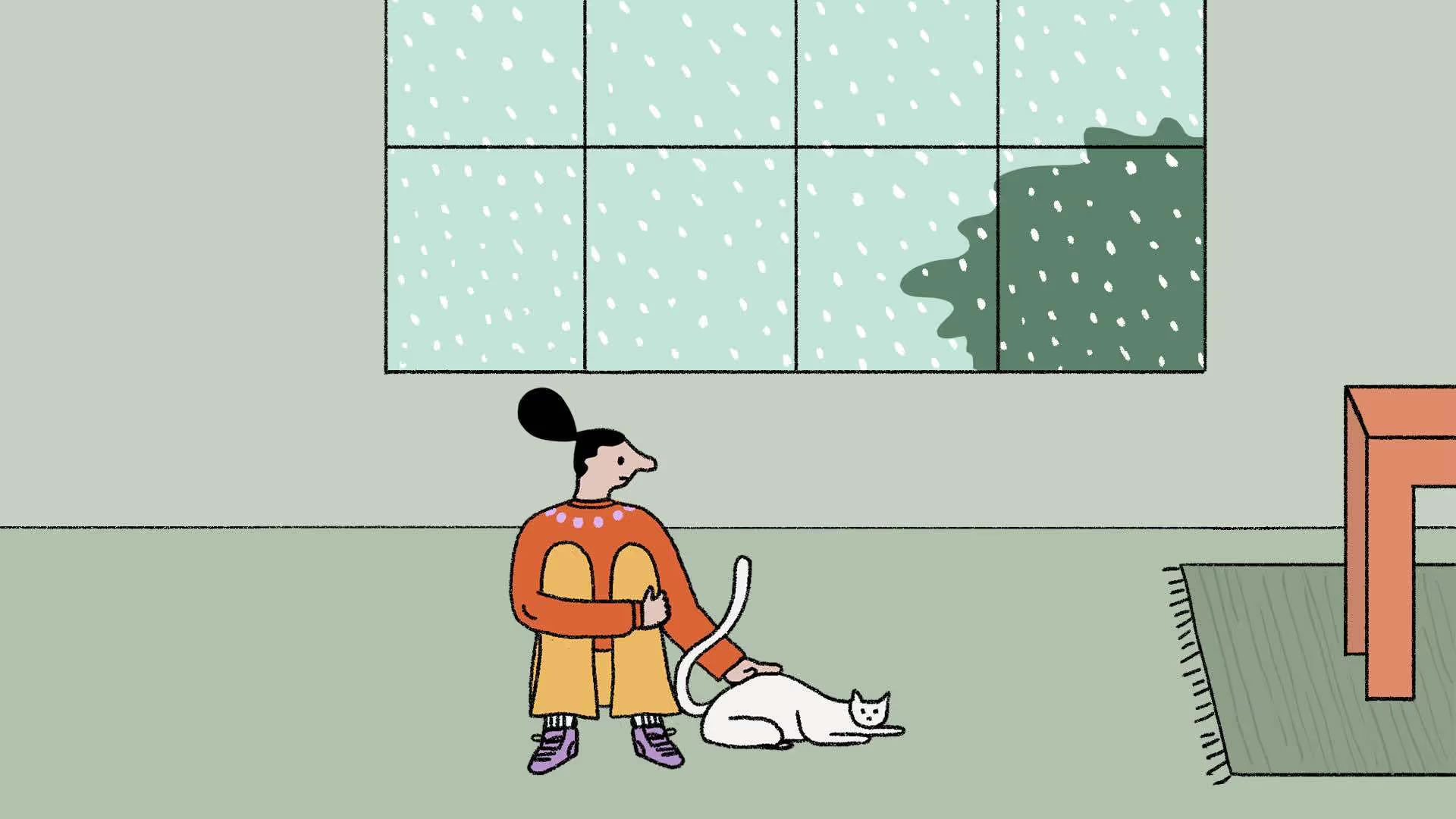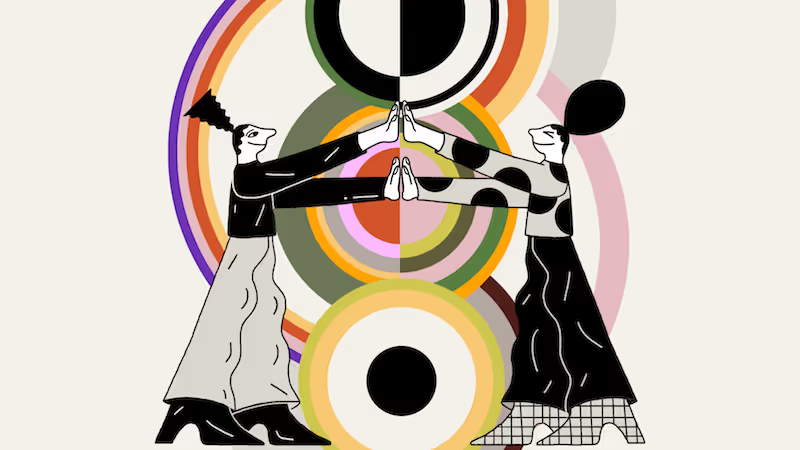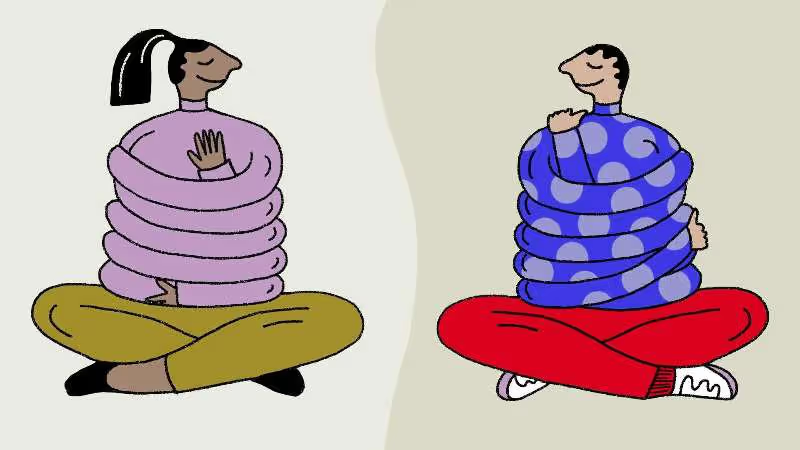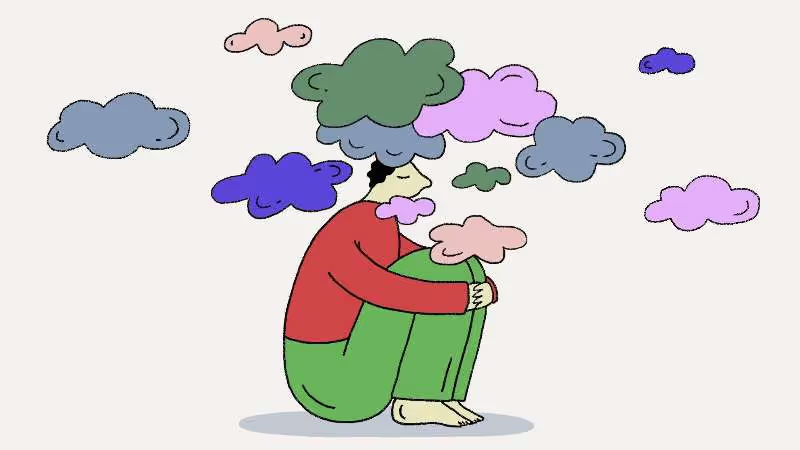Feeling lonely around the holidays can make us feel as if something is wrong with us. Everybody else seems to know how to be happy, how to be together, how to be festive, merry, and bright. But feeling lonely around the winter holidays is extremely common. And even more so during this year of isolation.
Before we can digest our Thanksgiving food, that familiar cheer creeps in. Twinkling lights on trees, menorahs and kinaras in windows, classic films on every channel, carols ringing out in the streets—these holiday symbols can inspire the best feelings in the world, but they can also feel oppressive when we’re finding it difficult to catch the spirit. It can seem as if everyone else occupies their own winter wonderland with people they love, money to buy food and toys, and even time to volunteer. This wrapped-in-a-bow fantasy is rarely the reality for most people. More often than not, the holidays are a time of increased stress and loneliness—even for self-proclaimed holiday fanatics. The National Alliance for Mental Illness cites “extra stress, unrealistic expectations, [and] sentimental memories that accompany the season” as sources of loneliness around the holidays for everyone, but especially for those of us who struggle with mental illness.
This extra pressure around holidays is especially intense in America because it’s often the one time each year when families come together. Some of us feel obligated to choose between families, and to buy plane tickets and gifts even when money is tight. Others among us feel that we have no one with whom to spend the holidays or that the people we long to be with are far away or no longer around—loved ones who have died and former partners, both of whom make up some of our happiest and most painful holiday memories.
The Holidays Evoke Both Pleasure and Pain
There is a moment in our adult lives when we realize that behind much of the holiday magic of our childhood were major sacrifices: our mother who stressed over getting the gifts we coveted; the father who missed many nights of family dinners working overtime to afford the big meal; the eldest sibling who pulled an all-nighter to wrap gifts and stood by while the young ones worshipped Santa Claus, marveling at his stamina. True holiday spirit lives in these profound gestures, but like all spirits, it can be haunting.
Even holiday memories formed in adulthood can feel like a shattered window to the past. We can barely make out the warm, glowing scene behind the cracks but we feel the heat long after the fire’s gone out. It’s the memories of a former lover with whom we created new traditions, who helped heal childhood wounds, only to eventually create newer traditions with someone else. It’s driving past the apartment where we celebrated with an old friend who’s no longer in our lives. It’s helping our mother downsize, watching her grapple with the decision to get rid of the wrapping paper she hoarded that was too nice to use. It’s buying gifts our children will get bored of in two weeks. It’s buying eggnog for one. There is perhaps no other time of year in which the pleasure and pain of our memories feels so routine, in which we experience such ambivalence about our own sense of joy.
Coping with Loneliness in a Time of Crisis
Holiday cards and social media posts of families in matching sweaters with mugs of hot cocoa present a nice picture, but behind every lush garland and wreath is the unspoken feelings that the holidays sometimes bring. It’s those feelings of scarcity—not having enough and not being enough. And this time of pandemic, economic strife, and global remoteness has amplified this. This year, how many of us can relate to the feelings of:
- Craving physical contact
- Longing to sit at a table together
- Exhaustion due to counting days since potential exposure
- Isolation because no one can visit this year, especially in nursing homes
- Desiring to shop and dine at our favorite local spots that have permanently closed—we miss those familiar faces
- Wanting to talk to a stranger in line about the gifts they’re buying
- Family tensions boiling over day after day while we remain on top of each other
- Navigating political differences that leave us pulling our hair out
- Not having enough money to get the gift we want for our partner
- Chronic judgement around pandemic protocol
- Wanting our kids to see their grandparents (and wanting our parents to help with the kids)
- Missing the office holiday party
- Going on a real first date
It is long-established that the mortality risks posed by loneliness and social isolation is comparable to those posed by smoking and obesity. That feels especially obvious this year. But if there is any silver lining to this year’s specific version of holiday loneliness, it’s that many of these circumstances are largely universal—and so are the resources to face them.
Reach Out & Reach In
We continue to be living through a period that demands collective resilience. Relationships are often the strongest protective factors to keep us tethered to ourselves in times of crisis. This holiday season is an opportunity to create new traditions that challenge the DNA of our society that says we have to do it all alone. This is a time to practice creative collectivism instead of Darwinian survival of the fittest. Send cards. Write letters. Acknowledge the people we think and care about by actually picking up the phone and calling them. Cook for someone; drop it off at their house. Foster a pet. Start an indoor garden. Take a long walk and say hello to those we pass. Identify one or two people in our social sphere and create an oath of accountability to cook healthier together. Cook with each other on FaceTime. Support a beloved local restaurant or small business by purchasing gifts cards and sending them to friends. Schedule monthly check-ins with loved ones and put it on both calendars. Join a virtual group, film forum, or a newspaper’s book club. Volunteer. Reach out to a nursing home to see if anyone wants to talk by phone. If you’re in a city, go listen to street musicians. Join a fan club. Do a live virtual exercise class.
There are many resources for turning holiday loneliness into strong relational health. But that’s easier said than done. When we’re experiencing loneliness, it can be especially difficult to reach out for help. With that in mind, we reached out to our own community to pull together resources for coping with holiday loneliness. This list was made with you in mind and it is yours to share with anyone you think might benefit from it. Consider it a mini reading club in which you can come together to discuss.
Our Community Resource Pool for Coping with Loneliness
Our social media channels were flooded with messages about how to cope with holiday loneliness. Here’s a sampling:
I have been feeling lonely during holidays for the last 8 years now. I learned to allow myself to feel sad and cry if needed but then get up and do something that makes me feel good such as going for a walk, doing a workout or have a dance party by myself.
Having something to look forward to everyday even if it’s small—walks, pets, a good book, an episode, a yoga session, cooking a slow meal.
Wake up early. The time that you think you should. A time that makes you proud of yourself just for getting out of bed. Make your bed. It’s a gift to yourself when you’re tired. Yoga 1hr. Put on clothes that you would wear outside the house. No track pants. Healthy breakfast. Fruit. Light filter coffee, but not too much. Work now. Focus. Be decisive and compassionate. If the sun comes out, go outside into it. Exercise. Maybe a quick run. Some pull ups. Or even just a walk. The cold air in your lungs and the sun in your eyes sends some kind of shockwave into the nervous system that makes you happy. Call the family. Use the L word. Meditate. Work more. Cook for yourself or your loved ones. Or let them cook for you. Thank them. Make them laugh. Eat and drink things from happy soil. Don’t eat shit. Chocolate isn’t shit. Chocolate is delicious. Squeeze in a little more work if it’ll help you sleep better later. Know your boundaries. Don’t use electronics in the bedroom after dinner. When your eyes start to sting, write a quick journal, then wash your face, brush your teeth (floss! It shows you that you care about yourself) and then read a book. Anything. Put on pyjamas, not your dirty undies from the day. Sleep in the clean folded sheets that you made for yourself earlier.
Watching Christmas movies from childhood (Home Alone, Christmas Vacation), listening to happy Christmas music that reminds me of happier times with family and baking all the favorite things my loved ones, who are gone, loved. Holidays aren’t as magical as I get older; it’s the memories and traditions that bring me joy.
Taking a walk or run, early in the morning before the kids wake up. I’ve been doing this for months and though I haven’t been feeling my best, spending energy alone and out of the house has helped a bit to cope. I come back home having taken 10,000 steps and the day is just beginning. That’s a good feeling.
A lot of warm showers and warm socks. Hot tea and a lot of blankets. Funny memes sent to friends and family.
Breathing exercises, taking care of my dog, putting on my favorite Christmas movies, preparing my grandma’s recipes.
I collect recipes of foods that friends and family members cook. I ask them to teach me how to make it. When I miss that person, I cook their dish. It doesn't taste the same of course, but it's more about reenacting the experience we had together.
Writing postcards and thank you cards with the good stuff that we shared during the year. The rest of the year I can't bring myself to do it because it seems too cheesy, but on Christmas and New Years there’s finally the right background mood for it.
I do what I would love to receive from others: I reach out.
Reading old letters and looking through pictures.
Writing down what I’m grateful for.
Let my dog sleep in my bed with me and hot baths.
Seek out ways to volunteer/help.
I go for walks and listen to podcasts.
FaceTime cocktail party with my tribe.
Secret santa with my friends based all over Europe.
Filling my house with Hygge, planning great gifts since we’re not seeing anyone for the holidays (really thinking through what people have talked about as interests and desires), embracing my kids’ innocence about what’s happening around us (their joy is easy), listening to podcasts who keep it real. The hosts start to feel like friends. FaceTiming often.
Expressing gratitude to people in the grocery store or on a customer service call. It helps me to recognize not only their help being important to the world, but also that the world has people in it who help me. It’s a gratitude that refills itself.
I light candles, put on some music, and write postcards to friends. Making postcards is a fun art process (or you can buy them) and postage is still less than 50 cents! Thinking about each person and what I want to say to them becomes a meditation on what I love about these dear ones, and helps me feel closer to them. I enjoy receiving physical, handwritten mail and I hope my little offerings help my friends feel my love for them across the distance!
Allow myself to feel. Watch the movies I love. Cook those holiday classics that remind me of great memories, but also remind myself of all the drama I will spare myself this year and go for a walk enjoying the snow!
Turn on music and dance—anything that will make me laugh. I create; sewing, painting, writing, designing. Take a calming bath with songs which will soothe me. Call my family and be silly with them. End the night with a tap on my own shoulder, saying you did good today.







.svg)





